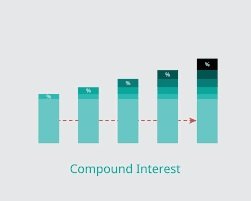Have you ever wondered how your savings could grow with minimal effort on your part? It is possible through compound interest, a financial concept that rewards patience and consistency. Whether you are saving for a dream house, your kids’ education, or retirement, the power of compounding can turn your small savings today into substantial financial achievements over time.
Keep reading to understand how compound interest works and how it can take your savings from “now” to “wow” with smart, consistent investing.
What is compound interest?
Compound interest means earning interest on both the principal amount and the interest that accumulates over time. Let’s break it down:
- Initial investment: You begin with a principal amount.
- Interest accrual: You earn interest on that principal.
- Reinvestment: The earned interest gets added to the principal.
- Repetition: This process repeats, with each cycle earning interest on a larger amount.
Four ways to maximise the power of compounding
Here are four ways to optimise the power of compounding and grow your hard-earned money efficiently:
1. Don’t wait for “the right time”
Many people delay saving, thinking they need more income or a larger amount to start. However, waiting costs valuable time as well as profits. Note that even a modest amount in mutual fund investments is enough to start building wealth.
For example, let’s say you plan to invest until the age of 60. If you start investing ₹5,000 monthly at age 35 instead of 40, assuming a 12% annual return, the difference is significant. By starting at 35, your corpus grows to approximately ₹95 lakh, while starting at 40 gives you only around ₹50 lakh. As you can see, just five years of delay can lead to a much smaller corpus.
You can use an online compound interest calculator to see this difference for yourself. Simply enter the monthly investment amount, expected annual return, and investment tenure to visualise how starting earlier multiplies your wealth.
2. Stay consistent with regular investments
To maintain consistency, you can invest in mutual fund schemes via Systematic Investment Plans (SIPs). SIPs allow you to invest a fixed sum regularly and stay disciplined without worrying about market fluctuations. Regular investments take full advantage of the compounding effect because every instalment gets more time to grow.
3. Choose investments offering higher returns
Focus on investments that offer higher long-term returns, such as equity mutual funds and Exchange-Traded Funds (ETFs). Higher returns mean that the interest or growth added each period is larger, which could lead to a faster accumulation of wealth. For example, an investment earning 8% annually will compound more rapidly than one earning 4%, as the higher returns contribute to a larger base for future compounding. This growth amplifies the impact of compounding over time.
4. Adopt a long-term approach
The longer you keep your money invested, the bigger it grows. In the early years, returns from your investments appear small because the growth accelerates gradually. Over time, compounding accelerates as the interest earned starts generating further returns. Exiting your investment too soon means missing out on this critical phase of growth where compounding has the greatest impact.
Conclusion
Compound interest has the power to transform your savings from “now” to “wow” when used effectively. By starting early and contributing consistently, you give your investments more opportunities to grow. Reinvesting returns amplifies this effect, and choosing higher-return options like equity mutual funds can further maximise growth.
Remember that even small investments can turn into a substantial amount when given sufficient time. So, start saving and investing today, and let compounding work in your favour to help meet your financial goals.























